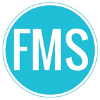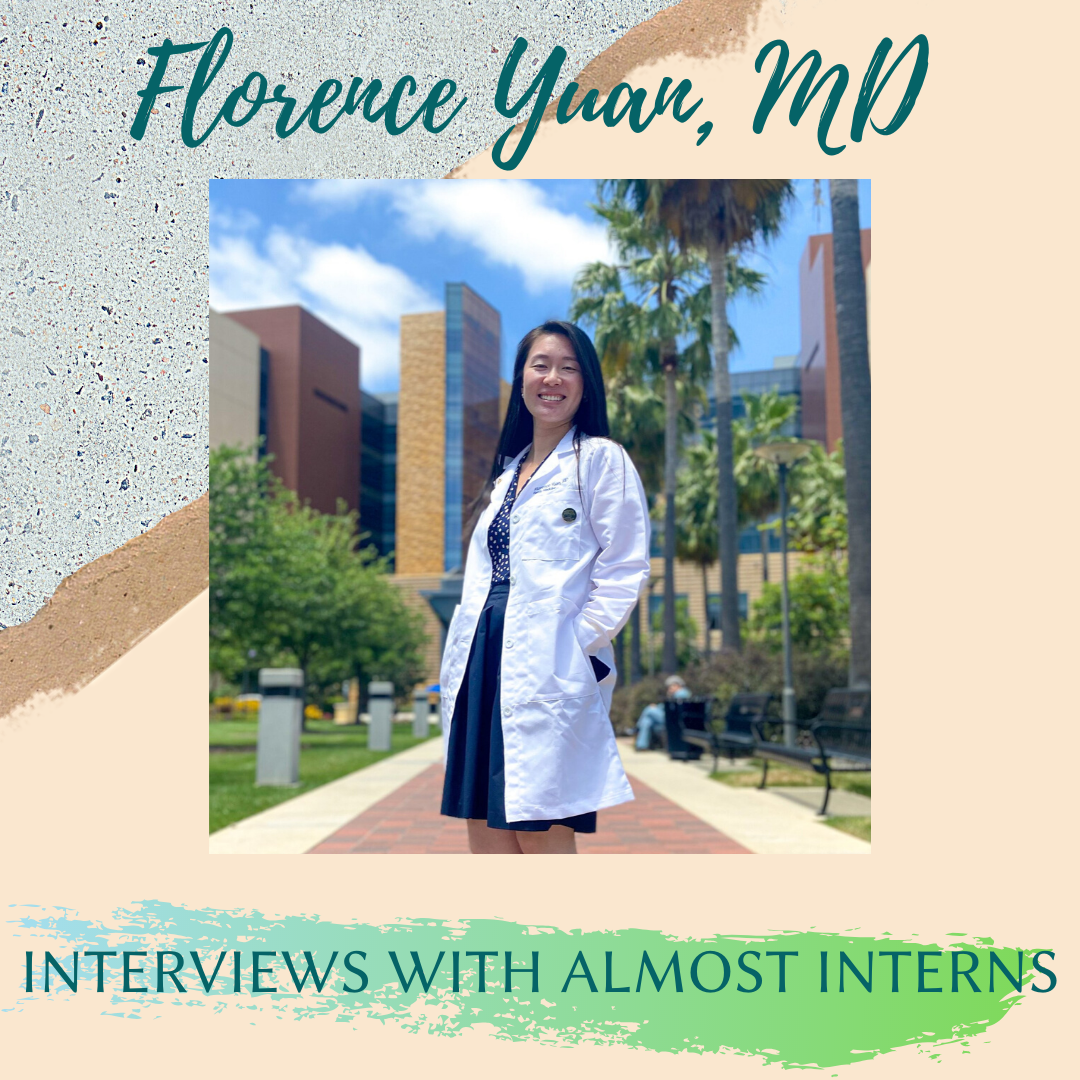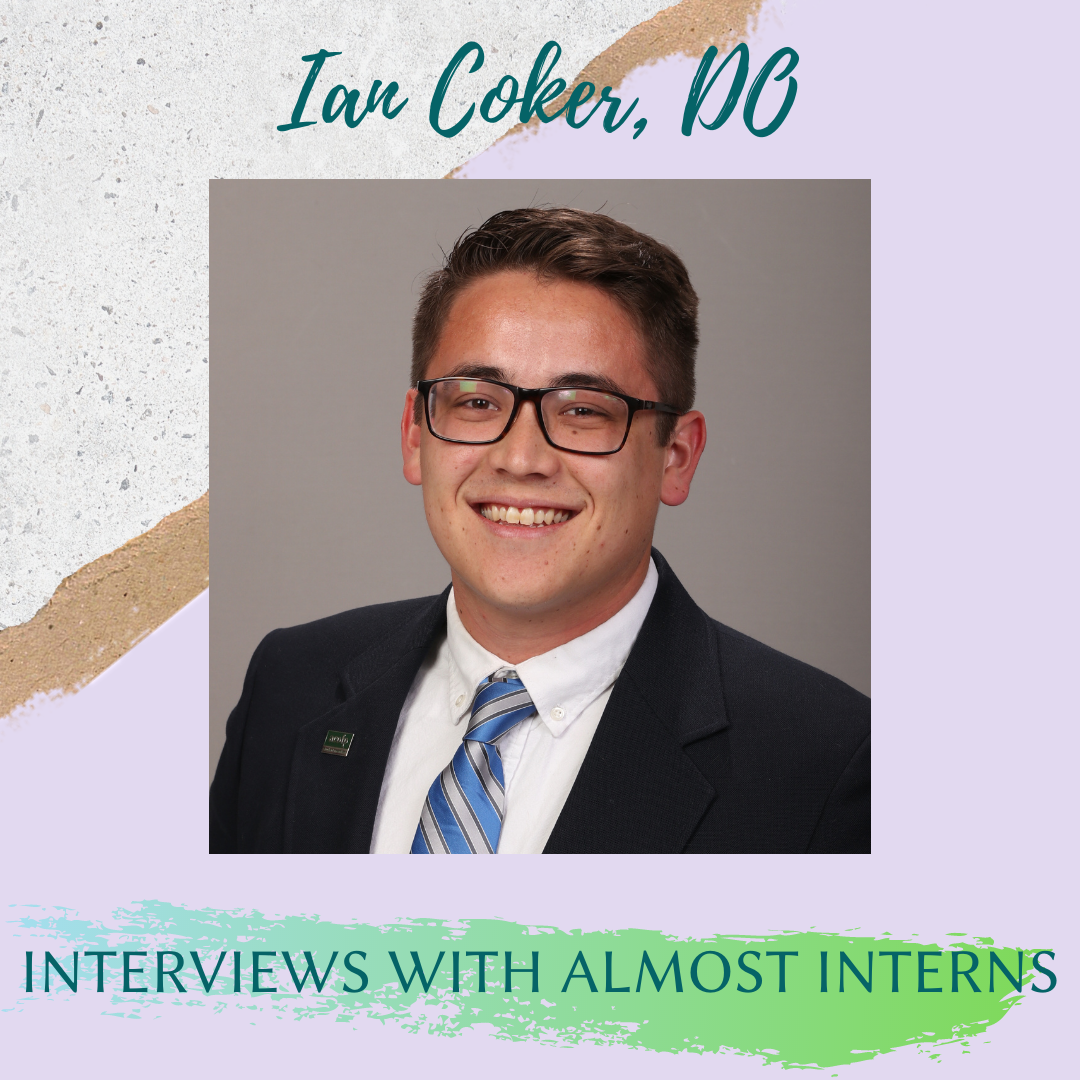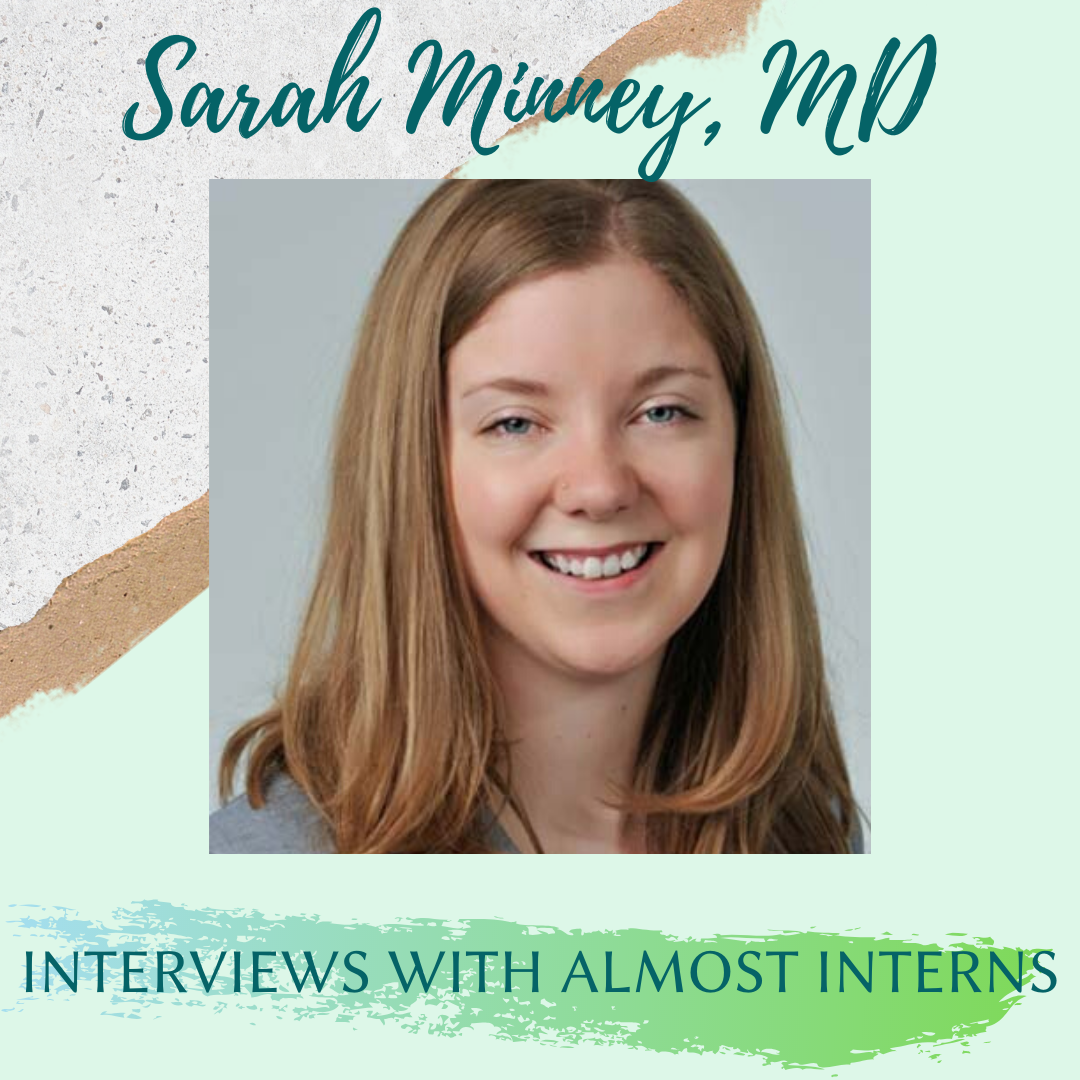Interview: Dr. Yuan
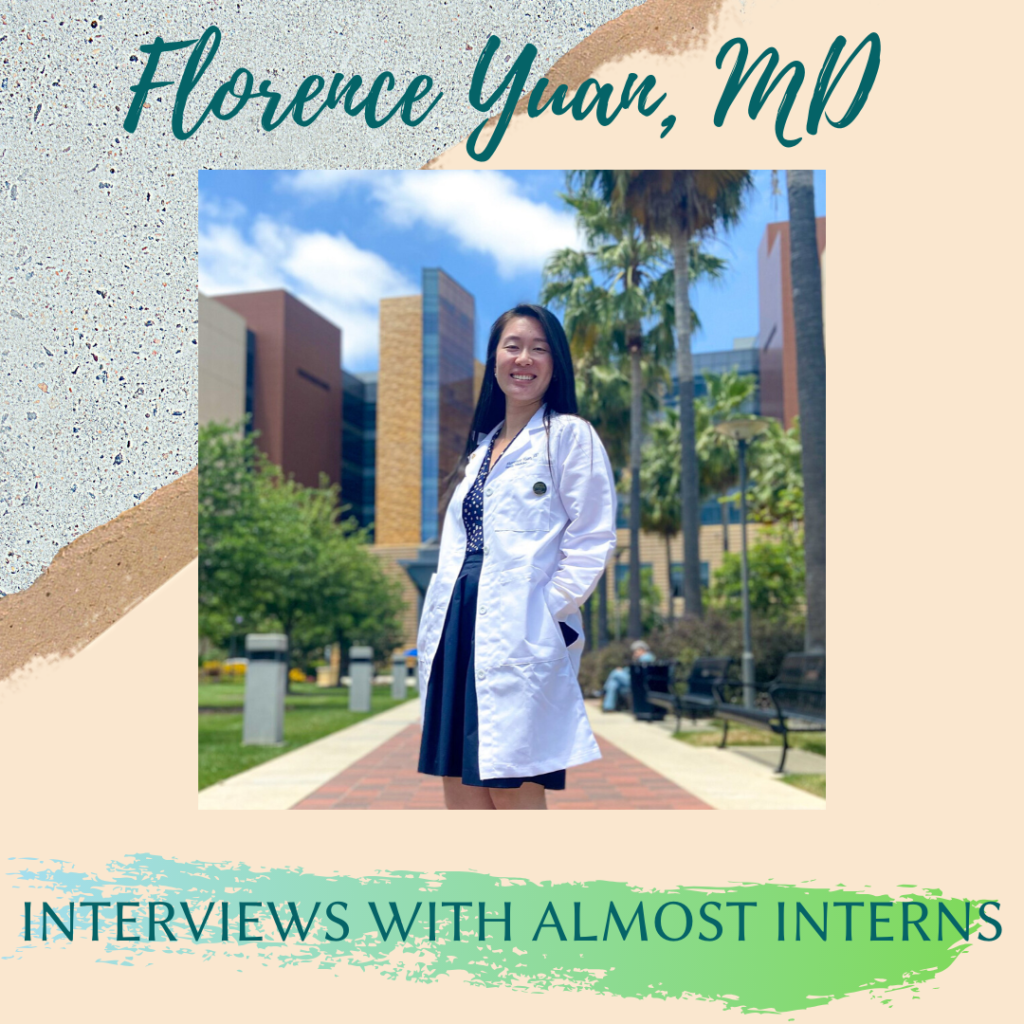
This is part of a series of interviews with current PGY1s, done during May and June 2020, asking their thoughts about residency application, interviewing and Match. We hope this is helpful to the current #Match2021 applicants, despite all the differences of applying during a pandemic.
What’s your elevator pitch?
I’m a proud Chinese-American who grew up in a family of musicians and teachers in Southern California. I’m excited to start training as a family physician in order to be the change I want to see in the world! My interests within medicine include health communication/media, community medicine, and medical education. My interests outside of medicine include music, reading, solving puzzles, organizing ALL THE THINGS, and running.
What was it like to be the first in your family to go into healthcare?
Applying to and getting through medical school was something I had to do largely on my own. I had no doctors in my family who I could ask, and I come from a lower middle class immigrant background, so I relied heavily on free online resources to understand what I was getting myself into. There was a lot about medical school that I just didn’t know until I got there—like, what is Step 1? How do you manage tens or hundreds of thousands of dollars of debt? What are all these specialties I’ve never heard of? What is a “hidden curriculum”?
I had to pick up all of that information as I went through applications and medical school itself. My classmates who had family members in medicine seemed to just “get it,” and sometimes I felt like I had to grasp for the curtain and rip it away to access what they already knew. I’m proud to be the first doctor in my family, though, and translating everything for my parents and relatives has strengthened my communication skills like nothing else.
I heard you play 3 different instruments…
I do play three different instruments! My first instrument is piano, which I started playing at the age of five. My second instrument is the pipa (琵琶), or Chinese lute, which is one of the instruments my mom teaches; I performed pipa at venues across California throughout middle school, high school, and college. My third instrument is the marimba, and percussion instruments more generally; I picked that up in high school and continued playing in wind ensembles and symphony orchestras through college. I didn’t have access to a piano or marimba much during medical school, but I brought my pipa with me and performed at cultural events or talent shows when I could. I’ll be bringing my pipa to residency, too!
Why Family Medicine?
I came into medical school knowing I wanted to do primary care, because I loved the generalist mindset and the idea of coordinating patients’ care across many years and multiple settings. However, I initially didn’t know what to choose between family medicine, internal medicine, pediatrics, or even med/peds. I thought about pediatrics for a long time because I love working with children and their families.
In the end, family medicine chose me. Even during my first and second years of medical school when I tried to keep an open mind about specialties, I found myself drawn to the Family Medicine Interest Group and to organizations led by family physicians, such as our student-run free clinic.
Ultimately, I realized that I do love caring for children, but I didn’t want to give up caring for adults and pregnant people and the elderly. I’m a jack-of-all-trades kind of person who loves learning about anything and everything, and family medicine’s broad scope satisfies my curiosity and thirst for knowledge. Plus, family physicians are just my kind of people! I committed to family medicine at the end of third year and never looked back.
Were you advised against FM?
No, though many of my mentors and sources of inspiration were family physicians and other primary care docs who loved their careers, so perhaps that’s why. Funnily enough, I faced more resistance from my family and friends, who joked that going into surgery or dermatology would provide me with a bigger return on my investment.
What would you say to medical students still trying to choose between FM and another path?
I have two main pieces of advice.
First, think about the big picture of what you want to do in your career. For many people, serving a specific population/community or working in a particular area of interest, such as women’s health or community advocacy, is what drives them to be physicians. What specialty can best help you achieve your career goals? (For example, one of my friends is going into family medicine because it will give her the best skill set to work in global health.)
Second, talk to as many people as you can who are in the specialties you’re considering. Ask them the tough questions. What frustrates them about their job? What do they do every day that you have to at least tolerate to enjoy their specialty? What changes do they see coming in the next 10 years?
How did you narrow down programs to apply to?
I was couples matching with my partner, who was also applying to family medicine, so that complicated things a little. We are both from California, and after four years in New England away from our families, we were ready to return, so we only applied to California programs. (That significantly slimmed down our lists!) We both preferred urban/suburban programs with broad-spectrum training and a commitment to the under-served, so that further helped narrow our lists. We kept things pretty open otherwise—we didn’t have a preference for academic vs. community or for opposed vs. unopposed programs, for example.
Did anything complicate your interview process?
As I mentioned, my partner and I participated in the couples match, both in family medicine. We definitely had to send a lot of emails to coordinate interview days or to try and get an interview for one person if we didn’t both receive invitations at the same time. We were incredibly fortunate in that scheduling often worked out for us, so we were able to travel together and interview on the same day in many cases. We worried about how couples matching might affect our relationship, but open communication and honest discussions about our program preferences made the whole process go more smoothly. Plus, traveling with him was fun!
How many programs did you apply to? How many interviews did you have and did you rank them all?
I applied to 26 programs, received 17 interview invitations, interviewed at 14 programs, and ultimately ranked 12 programs.
Do you enjoy teaching? You posted awhile back about resources to improve teaching to medical students.
I love teaching! I grew up helping to teach my mom’s younger students at rehearsals and performances, and I’ve tutored students of my own in music and various school subjects. I find that teaching others is the best way to consolidate and synthesize what I already know or want to learn more about. So much of being a doctor is about teaching, and I think teaching is one of the most impactful ways to improve the field of medicine.
Are you considering future training (beyond residency) or considering a fellowship?
Of the current available fellowship options, I like community medicine, adolescent medicine, and addiction medicine a lot. I’m not yet sure if I want to pursue additional training in any of those fields, though.
What was it like to write a speech for your OWN commencement?
My school has interested students submit a draft of the speech they’d like to give, and chooses the student commencement speaker based on the written draft. To be honest, I didn’t really think about how intimidating it would be to speak at my own commencement when I wrote it. I had things I wanted to say and people I wanted to honor, so I wrote that down and sent it in. I was shocked when I got the email that my speech was selected! It was such a privilege to speak at my own commencement, and I’m grateful that I had the opportunity to do so.
Imagining your post-residency self are you considering academic, rural or urban practice? Full spectrum or multi-spectrum, tell us what professional life looks like in five years!
I’m a city girl, so I definitely see myself in a major metropolitan area. I’m not necessarily set on academic medicine, but I love clinical preceptorship and want to incorporate precepting into my practice somehow. As far as scope of practice, I can do without C-sections but otherwise love pretty much everything. Addiction medicine, prenatal care, LGBTQ+ care, outpatient procedures… all are great! I do have a specific interest in street medicine and would love to precept at a free clinic or conduct street outreach as part of my practice.
How has COVID-19 affected your medical school experience, graduation and moving for residency plans?
I haven’t been as negatively affected as many other medical students across the country, for which I’m incredibly lucky. I finished all my clinical electives before COVID-19 really hit the U.S., and so I’ve been able to spend my months of social distancing at home with my family in Southern California. Yeah, a virtual Match Day and Commencement were not what I’d expected at the start of medical school, but I’m just grateful to have a job! Onboarding and moving for residency has been trickier, but the fact that I live within driving distance of my new residency program makes things way easier. I’m mainly worried about how COVID-19 will affect my intern year and my ability to see my parents when I’m working in the hospital all the time.
How has it been sharing your Animal Crossing island with your partner?
It’s going well! My partner would be quick to tell you that I’m a bit of a micro-manager, but it’s okay. I just move trees if he plants them in the wrong place. (He doesn’t mind it, I promise!)
How often do you wear your “wizard cap” while out and about
You can never wear that silly hat too often, I think 🙂 My partner and I wore our caps the other day while preparing dinner, and that made for some hilarious photos!
The wizard cap is the standard regalia for medical school graduation. Also, family medicine doctors are obviously wizards.
